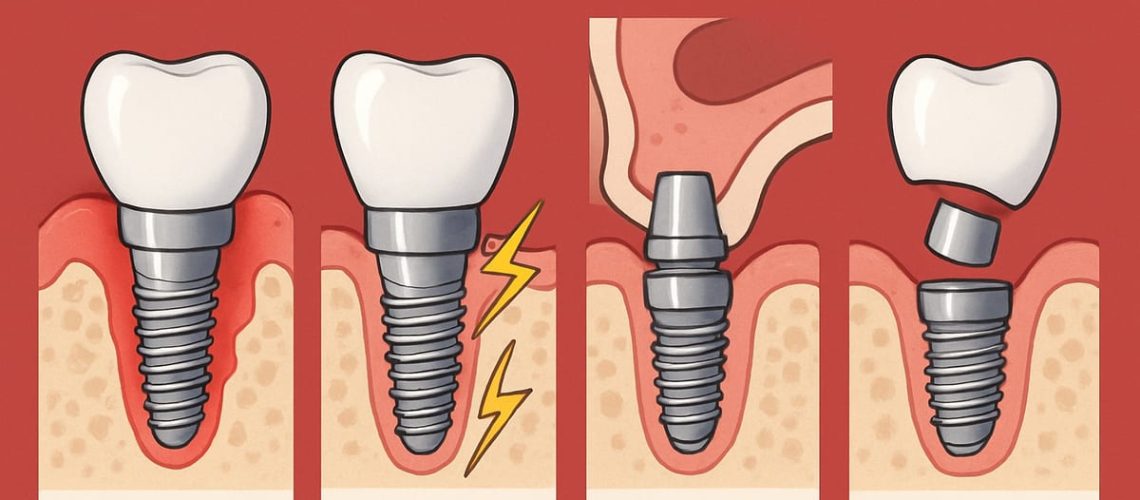This guide explains common signs, causes, diagnosis, and treatment for implant complications. You’ll learn how to spot early warning signs, what can cause problems, treatment options from simple care to surgery, and when to see an oral surgery specialist for help.
Common implant complications and how to spot them
Watch for these common problems so you can act quickly.
- Peri-implant mucositis and peri-implantitis: redness, swelling, bleeding when brushing, bad taste, or pus around the implant site.
- Pain or persistent sensitivity: normal soreness fades after a few days. Ongoing pain, sharp pain with biting, or a loose implant or crown are trouble signs.
- Nerve-related symptoms: numbness, tingling, or changed sensation in the lip, chin, or tongue after surgery.
- Sinus problems (upper implants): new or worsening sinus pressure, clear or foul discharge, or chronic congestion after implant placement.
- Early vs. late failure: early problems (days–weeks) often mean infection or poor healing; late failures (months–years) commonly relate to infection, overload, or bone loss.
If you live in the Dallas–Fort Worth area, patients noticing these signs should consider evaluation for implant complications in Dallas–Fort Worth as soon as possible.
Causes and risk factors for implant complications
Complications usually come from a mix of health, surgical, and follow-up issues:
- Patient health: smoking, uncontrolled diabetes, poor oral hygiene, osteoporosis, or prior head/neck radiation increase risk.
- Surgical and prosthetic factors: poor initial stability, wrong implant angle or position, occlusal overload from grinding, or a poorly fitting crown/prosthesis.
- Bone and soft-tissue issues: low bone volume, thin gum tissue, or untreated gum disease make implants less stable.
- Behavior and follow-up: skipping maintenance visits, poor home care, or delaying reporting symptoms lets small problems become serious.
Diagnosis and treatment options for implant complications
Quick diagnosis uses both exam and imaging to target the problem.
- Diagnostic tools: clinical exam with periodontal probing, periapical X-rays, and 3D CBCT scans to check bone, implant position, and nearby nerves or sinuses.
- Non-surgical care: professional cleaning/debridement, improved home hygiene, antiseptic rinses, antibiotics when needed, and occlusal adjustments to reduce load.
- Surgical options: guided flap surgery for peri-implantitis, bone grafting and regenerative techniques, or implant revision/removal when damage is severe.
For nerve injury or an acute spreading infection, emergency care is essential — early intervention can limit permanent problems. Preventive steps include careful pre-op risk assessment, staged treatment for high-risk patients, smoking cessation, and structured recall visits to catch issues early.
Patients should not delay. Those near Dallas–Fort Worth benefit from prompt evaluation for implant complications in Dallas–Fort Worth to preserve bone and avoid more invasive treatment.
When to seek specialist care and why expert surgeons matter
Refer immediately or seek specialist care for any of these red flags:
- Rapidly spreading infection or fever
- Progressive or complete numbness/altered sensation
- Sudden mobility of an implant or prosthesis
- Uncontrolled or escalating pain
Oral and maxillofacial surgeons use advanced imaging and digital planning to pinpoint causes and plan safe, effective revisions. At Texas Center for Oral Surgery & Dental Implants, board-certified surgeons offer CBCT imaging, dynamic surgical guidance, and PRF-enhanced grafting, plus on-site surgical options when complex care is needed. Their team can move quickly when complications require surgical management.
If you suspect implant problems, contact a qualified specialist promptly. Timely care preserves options and improves the chance of a successful outcome.

